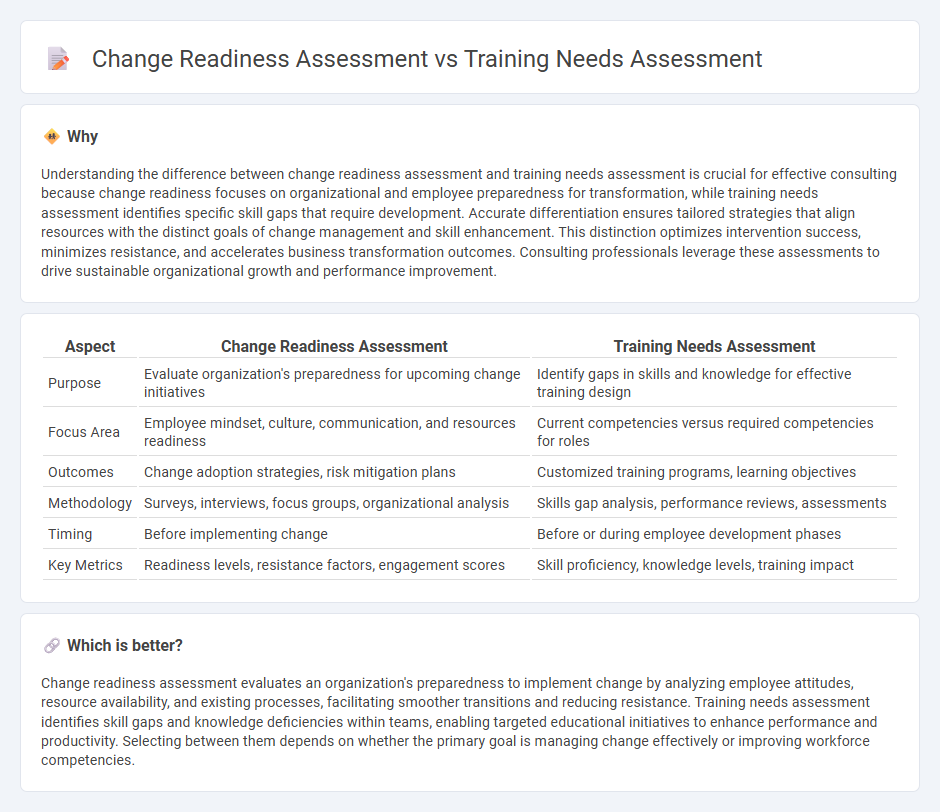
Change readiness assessment evaluates an organization's preparedness for implementing change by analyzing employee attitudes, resource availability, and leadership support to ensure successful transformation. Training needs assessment focuses on identifying skill gaps and knowledge deficits among employees to design targeted learning programs that enhance performance and productivity. Explore how these assessments can optimize your change management strategy.
Why it is important
Understanding the difference between change readiness assessment and training needs assessment is crucial for effective consulting because change readiness focuses on organizational and employee preparedness for transformation, while training needs assessment identifies specific skill gaps that require development. Accurate differentiation ensures tailored strategies that align resources with the distinct goals of change management and skill enhancement. This distinction optimizes intervention success, minimizes resistance, and accelerates business transformation outcomes. Consulting professionals leverage these assessments to drive sustainable organizational growth and performance improvement.
Comparison Table
| Aspect | Change Readiness Assessment | Training Needs Assessment |
|---|---|---|
| Purpose | Evaluate organization's preparedness for upcoming change initiatives | Identify gaps in skills and knowledge for effective training design |
| Focus Area | Employee mindset, culture, communication, and resources readiness | Current competencies versus required competencies for roles |
| Outcomes | Change adoption strategies, risk mitigation plans | Customized training programs, learning objectives |
| Methodology | Surveys, interviews, focus groups, organizational analysis | Skills gap analysis, performance reviews, assessments |
| Timing | Before implementing change | Before or during employee development phases |
| Key Metrics | Readiness levels, resistance factors, engagement scores | Skill proficiency, knowledge levels, training impact |
Which is better?
Change readiness assessment evaluates an organization's preparedness to implement change by analyzing employee attitudes, resource availability, and existing processes, facilitating smoother transitions and reducing resistance. Training needs assessment identifies skill gaps and knowledge deficiencies within teams, enabling targeted educational initiatives to enhance performance and productivity. Selecting between them depends on whether the primary goal is managing change effectively or improving workforce competencies.
Connection
Change readiness assessment evaluates an organization's preparedness for transformation by analyzing employee attitudes, resources, and potential barriers, directly informing the scope and focus of training needs assessment. Training needs assessment identifies specific skill gaps and knowledge deficiencies essential for successful change implementation, ensuring targeted development programs align with readiness levels. Together, these assessments optimize change management strategies, reducing resistance and enhancing workforce capability for effective transition.
Key Terms
**Training Needs Assessment:**
Training Needs Assessment identifies skill gaps and learning requirements essential for employee development and organizational performance improvement. This process evaluates current competencies against desired outcomes to tailor effective training programs, ensuring resources target critical areas. Explore how Training Needs Assessment drives strategic learning initiatives in your organization.
Skill Gap Analysis
Training needs assessment identifies specific skill gaps within an organization to design targeted learning programs that enhance employee capabilities and improve overall performance. Change readiness assessment evaluates the organization's preparedness for change, focusing on employee attitudes, skills, and resources required to adapt effectively. Explore detailed comparisons to understand how each assessment supports skill gap analysis and change management strategies.
Learning Objectives
Training needs assessment identifies specific skill gaps and learning objectives required to improve employee performance and achieve organizational goals. Change readiness assessment evaluates employees' preparedness and willingness to adopt new processes or technologies, aligning learning objectives with the cultural and operational shifts needed for successful change. Explore the detailed differences to optimize training strategies and enhance change management outcomes.
Source and External Links
Planning & Evaluating - OPM - A training needs assessment identifies performance gaps and the knowledge, skills, and abilities required by an agency's workforce to close those gaps, conducted at organizational, occupational, and individual levels to target resources effectively.
What Is a Training Needs Assessment? | Indeed.com - Training needs assessment evaluates where training is most needed at organizational, operational (task/job), and individual performance levels by identifying gaps between actual and expected skills and knowledge.
A Guide to Conducting a Training Needs Analysis [Free Template] - Training needs analysis uses techniques like observations, questionnaires, interviews, assessments, skills audits, and job analysis to detect gaps between the actual and desired competencies for informed training development.
 dowidth.com
dowidth.com